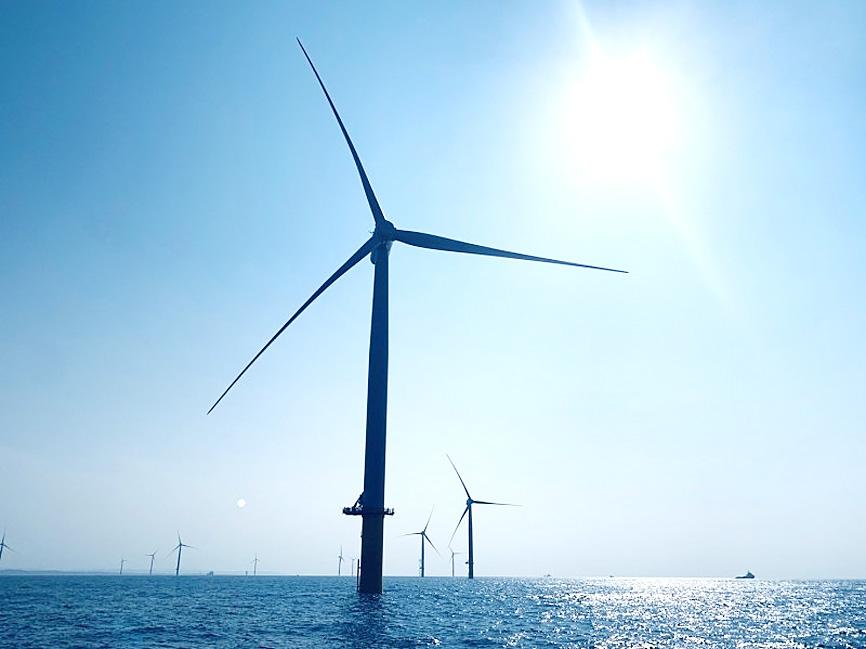The nation would be 40 percent behind schedule this year for its offshore wind farm targets, the Bureau of Energy said yesterday, citing delays related to the COVID-19 outbreak.
However, it said its goal to have “5 gigawatts [GW] in the water by 2025” remains unchanged.
“According to our contracts, a minimum of 933 megawatts [MW] was supposed to join the grid this year, but with the disruption caused by the COVID-19 outbreak, we are expecting only 557 megawatts,” the bureau said.

Photo: Lin Jing-hua, Taipei Times
The government’s ambitious plans for offshore wind farms originally called for as much as 2.6GW of power from wind turbine generators to join the grid by the end of this year, but there have been numerous delays, including the 376MW Formosa 2 project off Miaoli County implementing two six-month delays and the 350MW Liwei project near Taoyuan being canceled due to concerns over aviation safety.
The COVID-19 outbreak in May came in the middle of the prime construction season, causing major disruption for vessels working on projects after the Central Epidemic Command Center barred foreigners without Alien Resident Certificates from entering the nation.
While fresh crews were allowed to enter under a “special project permission,” Energy Technology Division Director Chen Chung-hsien (陳崇憲) said that receiving permission had been “onerous.”
Companies say that the inability to rotate crews has not just caused project delays, but also mental health issues for workers.
“The timing is very unfortunate,” said Raoul Kubitschek, a renewable energy expert at the Taiwan branch of consultancy NIRAS Gruppen A/S. “We have until October before the monsoon makes it impossible to work at sea for the rest of the year.”
Work would then restart in March next year and Kubitschek said that the knock-on effects might make it difficult to catch up.
“There will be bottlenecks, such as availability of harbor space, that will make it difficult to catch up on the lost time,” he said.

Taiwanese actress Barbie Hsu (徐熙媛) has died of pneumonia at the age of 48 while on a trip to Japan, where she contracted influenza during the Lunar New Year holiday, her sister confirmed today through an agent. "Our whole family came to Japan for a trip, and my dearest and most kindhearted sister Barbie Hsu died of influenza-induced pneumonia and unfortunately left us," Hsu's sister and talk show hostess Dee Hsu (徐熙娣) said. "I was grateful to be her sister in this life and that we got to care for and spend time with each other. I will always be grateful to

UNITED: The premier said Trump’s tariff comments provided a great opportunity for the private and public sectors to come together to maintain the nation’s chip advantage The government is considering ways to assist the nation’s semiconductor industry or hosting collaborative projects with the private sector after US President Donald Trump threatened to impose a 100 percent tariff on chips exported to the US, Premier Cho Jung-tai (卓榮泰) said yesterday. Trump on Monday told Republican members of the US Congress about plans to impose sweeping tariffs on semiconductors, steel, aluminum, copper and pharmaceuticals “in the very near future.” “It’s time for the United States to return to the system that made us richer and more powerful than ever before,” Trump said at the Republican Issues Conference in Miami, Florida. “They

REMINDER: Of the 6.78 million doses of flu vaccine Taiwan purchased for this flu season, about 200,000 are still available, an official said, following Big S’ death As news broke of the death of Taiwanese actress and singer Barbie Hsu (徐熙媛), also known as Big S (大S), from severe flu complications, the Centers for Disease Control (CDC) and doctors yesterday urged people at high risk to get vaccinated and be alert to signs of severe illness. Hsu’s family yesterday confirmed that the actress died on a family holiday in Japan due to pneumonia during the Lunar New Year holiday. CDC Deputy Director-General Tseng Shu-hui (曾淑慧) told an impromptu news conference that hospital visits for flu-like illnesses from Jan. 19 to Jan. 25 reached 162,352 — the highest

TAIWAN DEFENSE: The initiative would involve integrating various systems in a fast-paced manner through the use of common software to obstruct a Chinese invasion The first tranche of the US Navy’s “Replicator” initiative aimed at obstructing a Chinese invasion of Taiwan would be ready by August, a US Naval Institute (USNI) News report on Tuesday said. The initiative is part of a larger defense strategy for Taiwan, and would involve launching thousands of uncrewed submarines, surface vessels and aerial vehicles around Taiwan to buy the nation and its partners time to assemble a response. The plan was first made public by the Washington Post in June last year, when it cited comments by US Indo-Pacific Commander Admiral Samuel Paparo on the sidelines of the Shangri-La Dialogue